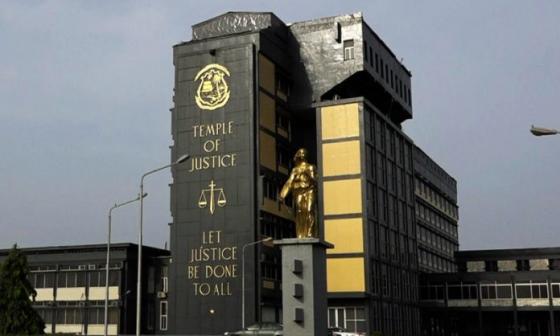Liberia: Judge Rejects Forensic Examiner Request in Cocaine Smuggling Case

Supreme Court of Liberia.
— Dixon’s objection means the alleged cocaine, whose authenticity cannot be proven for now, has been recorded as evidence in the case.
The judge overseeing the US$100 million cocaine smuggling case has rejected a request from the defense lawyers for a forensic examiner to assess the authenticity of a plastic bag of cocaine prosecutors had presented in court as evidence.
The defense lawyers had argued that the allege cocaine was never presented to them during the discovery proceedings after which the defendants were indicted by the Grand Jury for Montserrado County.
But Judge Blamo Dixon of Criminal Court ‘C’ dismissed the request on grounds that the defense lawyers should have objected to the prosecutor's evidence during its first line of questioning.
Dixon's objection means the alleged cocaine, whose authenticity cannot be proven for now, has been recorded as evidence in the case. The ‘cocaine’ in question is key in prosecutors’ quest to have the defendants convicted for the crimes of money laundering, unlicensed possession and importation of controlled drugs, and criminal conspiracy.
This is despite the prosecution admitting that they did not disclose the purported cocaine in dispute with the defense lawyers during the early stage of the trial. The admission, however, from Dixon was not enough to approve the defense lawyers’ request for a forensic expert to confirm the cocaine’s validity — a key evidence that would determine whether the four men accused are guilty or not.
Under Liberian law, discovery enables the parties to know before the trial begins what evidence may be presented. It intends to prevent trial by ambush, where one side does not learn of the other side’s evidence or witnesses until the trial, when there is no time to obtain answering evidence.
The defense lawyers’ issues about the prosecution’s evidence came during the questions of Samuel Nimley, the General manager of A JA Group Holdings. The company raised the alarm that led to the bust of the US$100 million worth of cocaine in October 2022. The AJA Group Holdings had been offered US$200,000 for the entire container which, at the time, cost less than US$30K.
This came after Oliver Zayzay, a Liberian national, and some of his foreign associates were arrested after seeking to purchase what appeared to be a shipping container full of fresh frozen pig feet from a refrigerated storage facility in Monrovia.
The amount was then increased to US$400,000 and, finally, to US$1 million – a red flag which forced the company to to blow the alarm that led to bursting of the drugs.
Nimely was then questioned whether he could remember the sample of the cocaine arrested in one of his company’s containers if present.
He then answered in the affirmative. However, the defense lawyers objected to him identifying the alleged plastic bag of cocaine, saying “This evidence caught us by surprise because at the Magisterial Court they did not bring it there.”
“They only brought to us a small match box of what they claimed was the cocaine,'' James Kumeh argued for the defense lawyer." In the law this is an ambush and how would we know that it is not a cassava powder or sugar that is in the plastic bag. "
Kumeh then pleaded with Judge Dixon not to accept the alleged plastic bag, which prosecutors had claimed as evidence in the absence of testing… “by an expert to establish whether it is truly cocaine in the plastic bag.”
He continued: “We are talking about people’s lives and nobody should make a mockery of this by passing sugar around here in a plastic bag saying it is cocaine.
But Dixon responded by saying that the defense lawyers should have objected earlier when Nimley had responded to the questioning.
“Nimley is a witness and not a police officer or an officer of the Liberian Drugs Enforcement Authorities, rather a lay person who is seen to be an eyewitness from the beginning of the case,” the judge said.
“At the time of the confiscated of the cocaine and during his testimony, he testified that it was based on his alert that the cocaine was arrested," Dixon recounts Nimley 's testimony, "upon the conclusion of his testimony, it was when the prosecution asked if whether he saw the cocaine he would recognized it."
“And, Nimley answered yes,” Dixon said.
“It was at the time of the first line of questioning you should have objected. But to object to the second question is not necessary, therefore the objection is denied and the witness should answer the question,Z” Dixon's ruling said.
Meanwhile, the trial continued today as defense lawyers Nimely cross examine the truthfulness of the Nimely company account of the drug bust.
The case, which is now proceeding smoothly, at some point suffered several delays.
At a point, it had to be started afresh after the defendants, Malam Conte. a Guinea-Bissau national who is fluent in Arabic and Makki Admeh Issam, a Portuguese, the key figure in the case claimed that they needed a translator because they could not speak English language that is being used by the court for the case.
The government however contacted two translators, Larsana Keita was nominated by the Ministry of Foreign Affairs to help translate in Arabic language and Tito Abanobi for the Portuguese.
They were rejected by the defendants on grounds that the two guys were not fluent in Arabic and Portuguese respectively, which led to the introduction of the machine translation.
The machine translation was subsequently done by the parties, ( the court, defense and prosecution). It was tried shortly after its acceptance to provide on-the-spot translations through headphones in English, Arabic and Portuguese.
